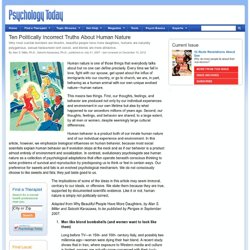

5 Insane Ways Words Can Control Your Mind. On some level we already know that language shapes the way we think.

We're automatically more afraid to fight a guy named Jack Savage than somebody named Peewee Nipplepuss, even if we've never seen either of them before. It's totally illogical, but you probably run into an example of that every day, and don't notice it. While we tend to think words are just sounds we make to express ideas, science is finding that language is more like a fun house mirror, warping what we see in mind-blowing ways. For instance ... Speaking English Makes Us More Likely to Blame People Let's say your roommate Steve is jumping on your bed. How will you answer? Keep in mind, Steve pulls this shit all the time. The answer largely depends on what language you speak. Stanford scientists did experiments on this, by having speakers of various languages watch videos featuring, in various situations, people breaking eggs or popping balloons, sometimes on purpose, sometimes on accident.
Will nothing stop his madness? Psychology Today - StumbleUpon. Yes, you too can see through the defenses people hide behind. To guide you, just consult the handy primer below. Put together by psychiatrist Emanuel H. Rosen, it distills years of Freudian analytical training into a few simple principles that make sense of our psyches.
I have always thought it horribly unfortunate that there is such a tremendous gap between psychiatry and popular culture. The Science of Sarcasm? Yeah, Right. 10 More Common Faults in Human Thought. Humans This list is a follow up to Top 10 Common Faults in Human Thought.

Thanks for everyone’s comments and feedback; you have inspired this second list! It is amazing that with all these biases, people are able to actually have a rational thought every now and then. There is no end to the mistakes we make when we process information, so here are 10 more common errors to be aware of.
The confirmation bias is the tendency to look for or interpret information in a way that confirms beliefs. The Availability heuristic is gauging what is more likely based on vivid memories. Illusion of Control is the tendency for individuals to believe they can control or at least influence outcomes that they clearly have no influence on. Interesting Fact: when playing craps in a casino, people will throw the dice hard when they need a high number and soft when they need a low number.
The Planning fallacy is the tendency to underestimate the time needed to complete tasks. Bonus Attribute Substitution. Ten Politically Incorrect Truths About Human Nature. Human nature is one of those things that everybody talks about but no one can define precisely.

Every time we fall in love, fight with our spouse, get upset about the influx of immigrants into our country, or go to church, we are, in part, behaving as a human animal with our own unique evolved nature—human nature. This means two things. First, our thoughts, feelings, and behavior are produced not only by our individual experiences and environment in our own lifetime but also by what happened to our ancestors millions of years ago. Second, our thoughts, feelings, and behavior are shared, to a large extent, by all men or women, despite seemingly large cultural differences. Human behavior is a product both of our innate human nature and of our individual experience and environment. The implications of some of the ideas in this article may seem immoral, contrary to our ideals, or offensive. Want to Think Logically? Trust Your Emotions. Top 10 Thinking Traps Exposed.
Our minds set up many traps for us. Unless we’re aware of them, these traps can seriously hinder our ability to think rationally, leading us to bad reasoning and making stupid decisions. Features of our minds that are meant to help us may, eventually, get us into trouble. Here are the first 5 of the most harmful of these traps and how to avoid each one of them. 1. The Anchoring Trap: Over-Relying on First Thoughts “Is the population of Turkey greater than 35 million? Lesson: Your starting point can heavily bias your thinking: initial impressions, ideas, estimates or data “anchor” subsequent thoughts.
This trap is particularly dangerous as it’s deliberately used in many occasions, such as by experienced salesmen, who will show you a higher-priced item first, “anchoring” that price in your mind, for example. What can you do about it? Always view a problem from different perspectives. 2. Consider the status quo as just another alternative. 3. Be OK with making mistakes. Category:Puzzles. Thinking Methods.
Language.